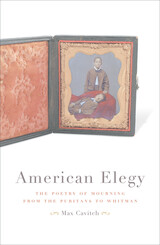2 books by Cavitch, Max

American Elegy
The Poetry of Mourning from the Puritans to Whitman
Max Cavitch
University of Minnesota Press, 2007
The most widely practiced and read form of verse in America, “elegies are poems about being left behind,” writes Max Cavitch. American Elegy is the history of a diverse people’s poetic experience of mourning and of mortality’s profound challenge to creative living. By telling this history in political, psychological, and aesthetic terms, American Elegy powerfully reconnects the study of early American poetry to the broadest currents of literary and cultural criticism.Cavitch begins by considering eighteenth-century elegists such as Franklin, Bradstreet, Mather, Wheatley, Freneau, and Annis Stockton, highlighting their defiance of boundaries—between public and private, male and female, rational and sentimental—and demonstrating how closely intertwined the work of mourning and the work of nationalism were in the revolutionary era. He then turns to elegy’s adaptations during the market-driven Jacksonian age, including more obliquely elegiac poems like those of William Cullen Bryant and the popular child elegies of Emerson, Lydia Sigourney, and others. Devoting unprecedented attention to the early African-American elegy, Cavitch discusses poems written by free blacks and slaves, as well as white abolitionists, seeing in them the development of an African-American genealogical imagination. In addition to a major new reading of Whitman’s great elegy for Lincoln, “When Lilacs Last in the Dooryard Bloom’d,” Cavitch takes up less familiar passages from Whitman as well as Melville’s and Lazarus’s poems following Lincoln’s death. American Elegy offers critical and often poignant insights into the place of mourning in American culture. Cavitch examines literary responses to historical events—such as the American Revolution, Native American removal, African-American slavery, and the Civil War—and illuminates the states of loss, hope, desire, and love in American studies today.Max Cavitch is assistant professor of English at the University of Pennsylvania.
[more]

Situation Critical
Critique, Theory, and Early American Studies
Max Cavitch and Brian Connolly, editors
Duke University Press, 2024
The contributors to Situation Critical argue for the continued importance of critique to early American studies, pushing back against both reductivist neo-empiricism and so-called postcritique. Bringing together essays by a diverse group of historians and literary scholars, editors Max Cavitch and Brian Connolly demonstrate that critique is about acknowledging that we are never simply writing better or worse accounts of the past, but accounts of the present as well. The contributors examine topics ranging from the indeterminacy of knowledge and history to Black speculative writing and nineteenth-century epistemology, the role of the unconscious in settler colonialism, and early American writing about masturbation, repression, religion, and secularism and their respective influence on morality. The contributors also offer vital new interpretations of major lines of thought in the history of critique—especially those relating to Freud and Foucault—that will be valuable both for scholars of early American studies and for scholars of the humanities and interpretive social sciences more broadly.
Contributors. Max Cavitch, Brian Connolly, Matthew Crow, John J. Garcia, Christopher Looby, Michael Meranze, Mark J. Miller, Justine S. Murison, Britt Rusert, Ana Schwartz, Joan W. Scott, Jordan Alexander Stein
Contributors. Max Cavitch, Brian Connolly, Matthew Crow, John J. Garcia, Christopher Looby, Michael Meranze, Mark J. Miller, Justine S. Murison, Britt Rusert, Ana Schwartz, Joan W. Scott, Jordan Alexander Stein
[more]
READERS
Browse our collection.
PUBLISHERS
See BiblioVault's publisher services.
STUDENT SERVICES
Files for college accessibility offices.
UChicago Accessibility Resources
home | accessibility | search | about | contact us
BiblioVault ® 2001 - 2024
The University of Chicago Press









